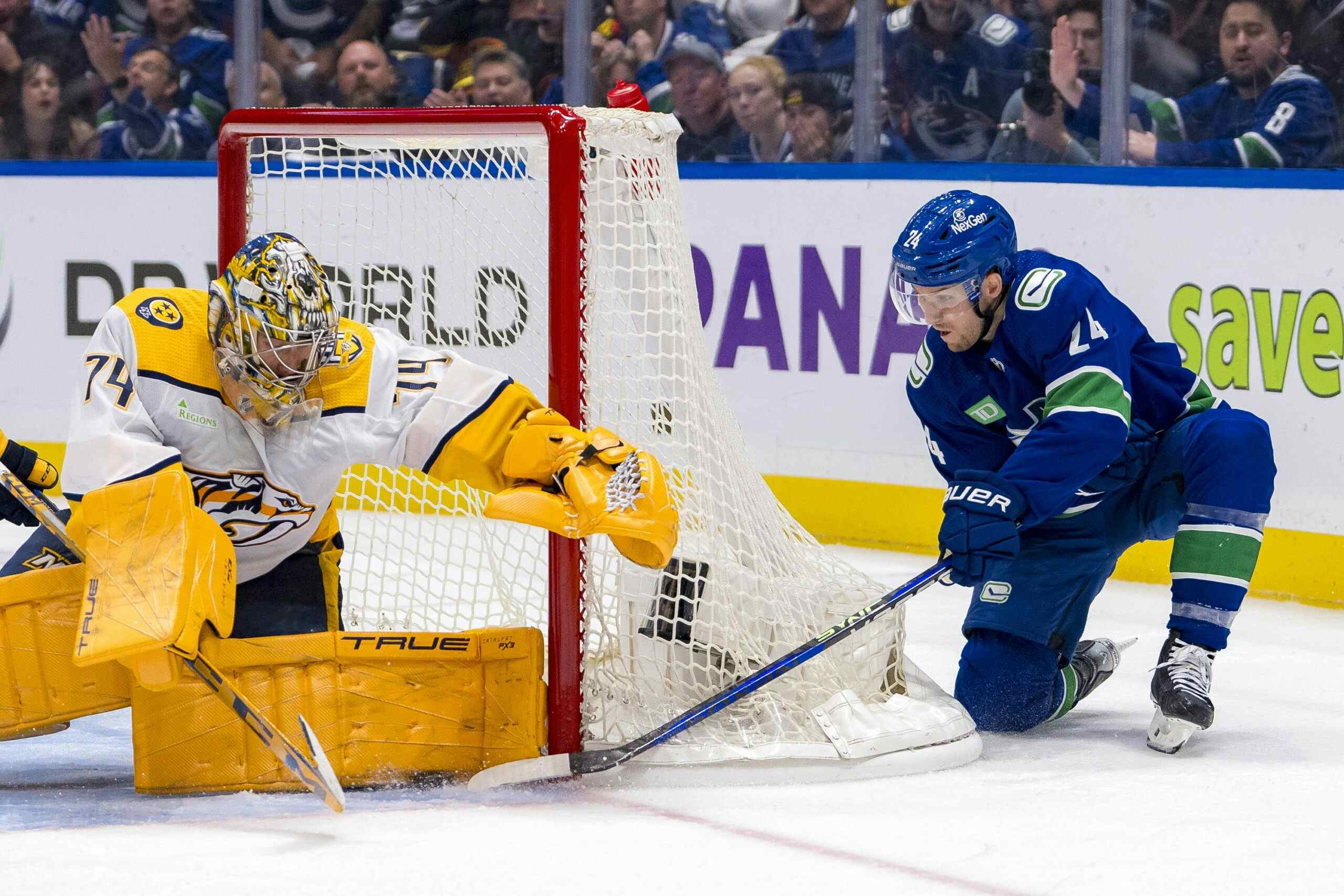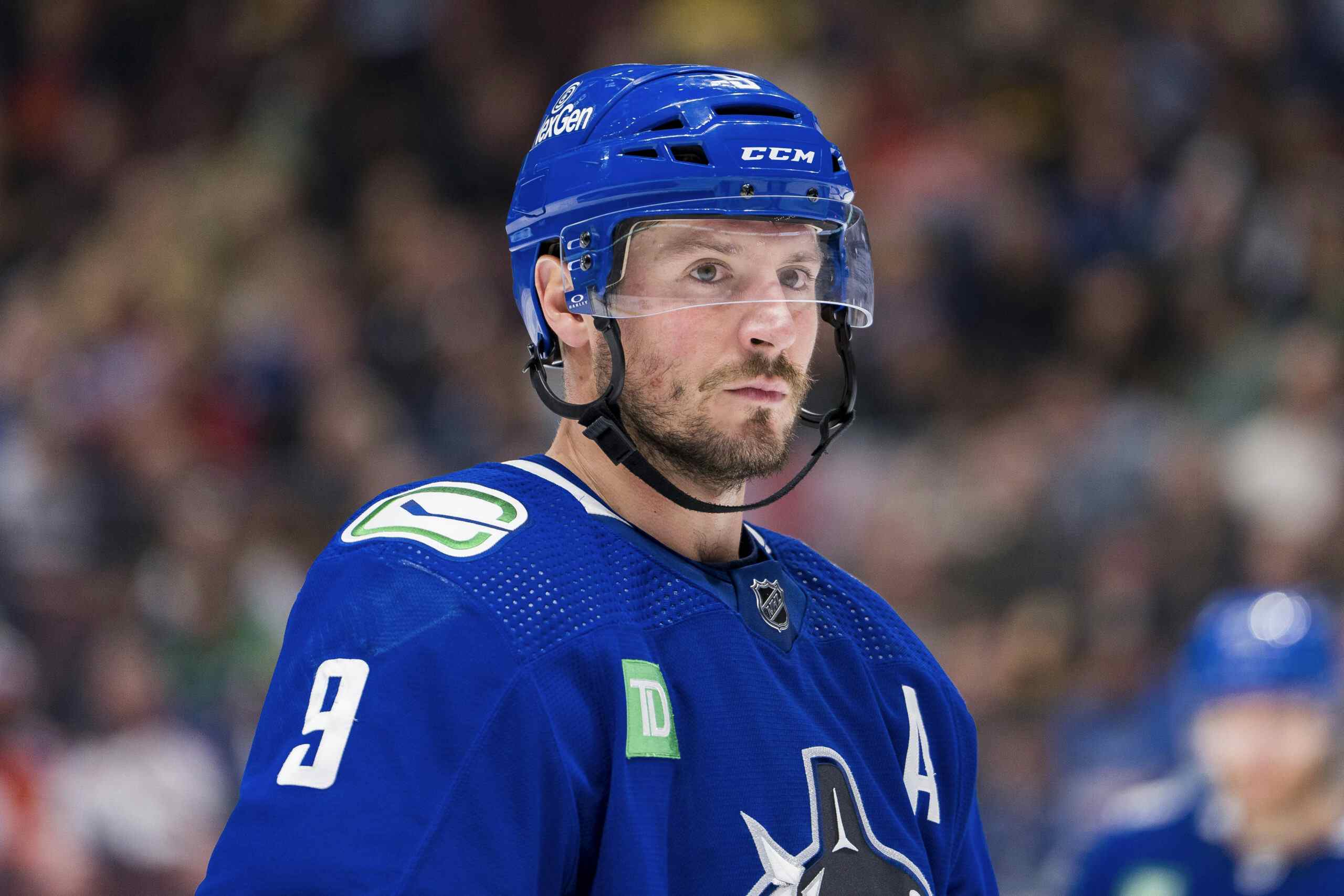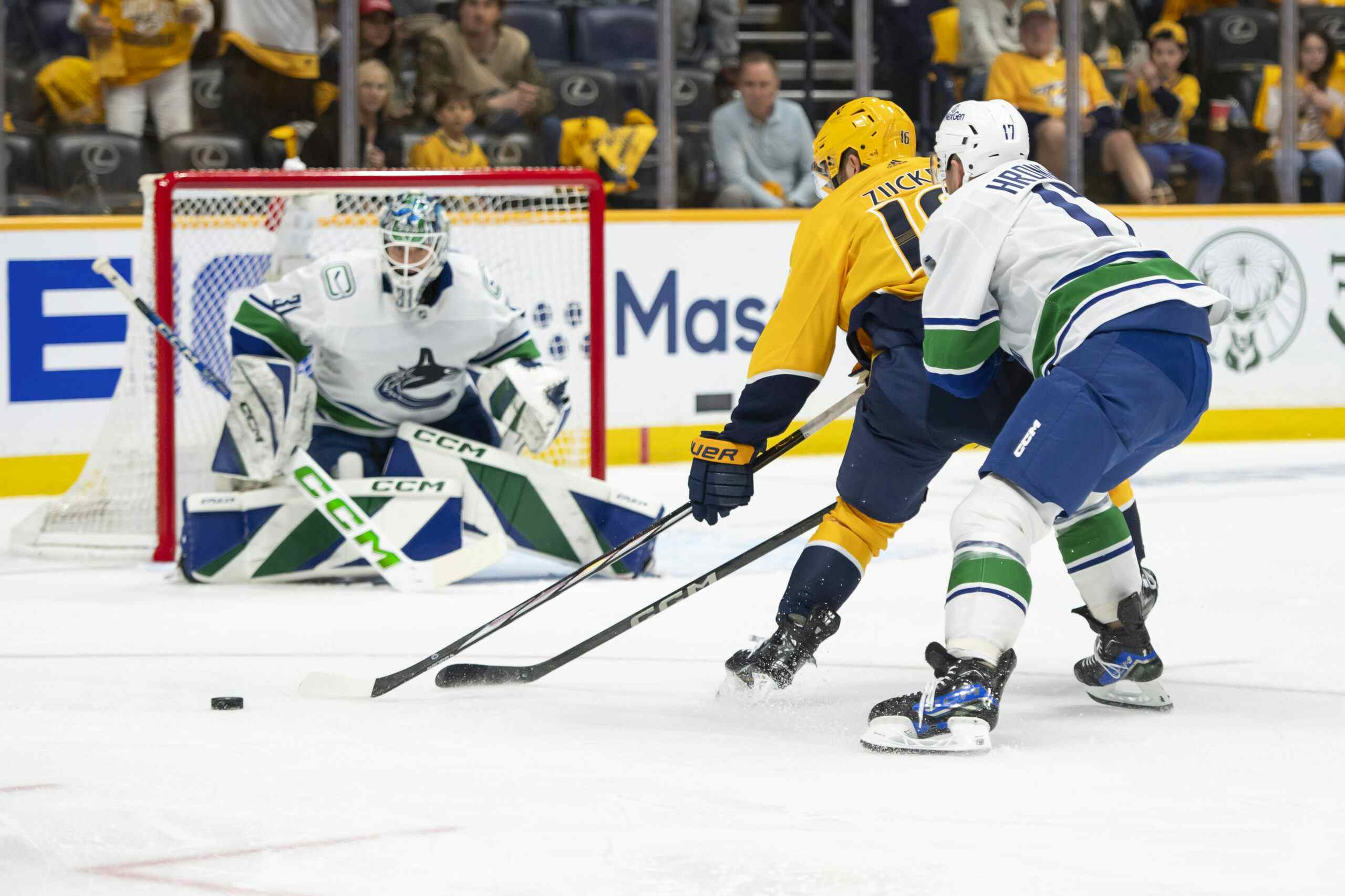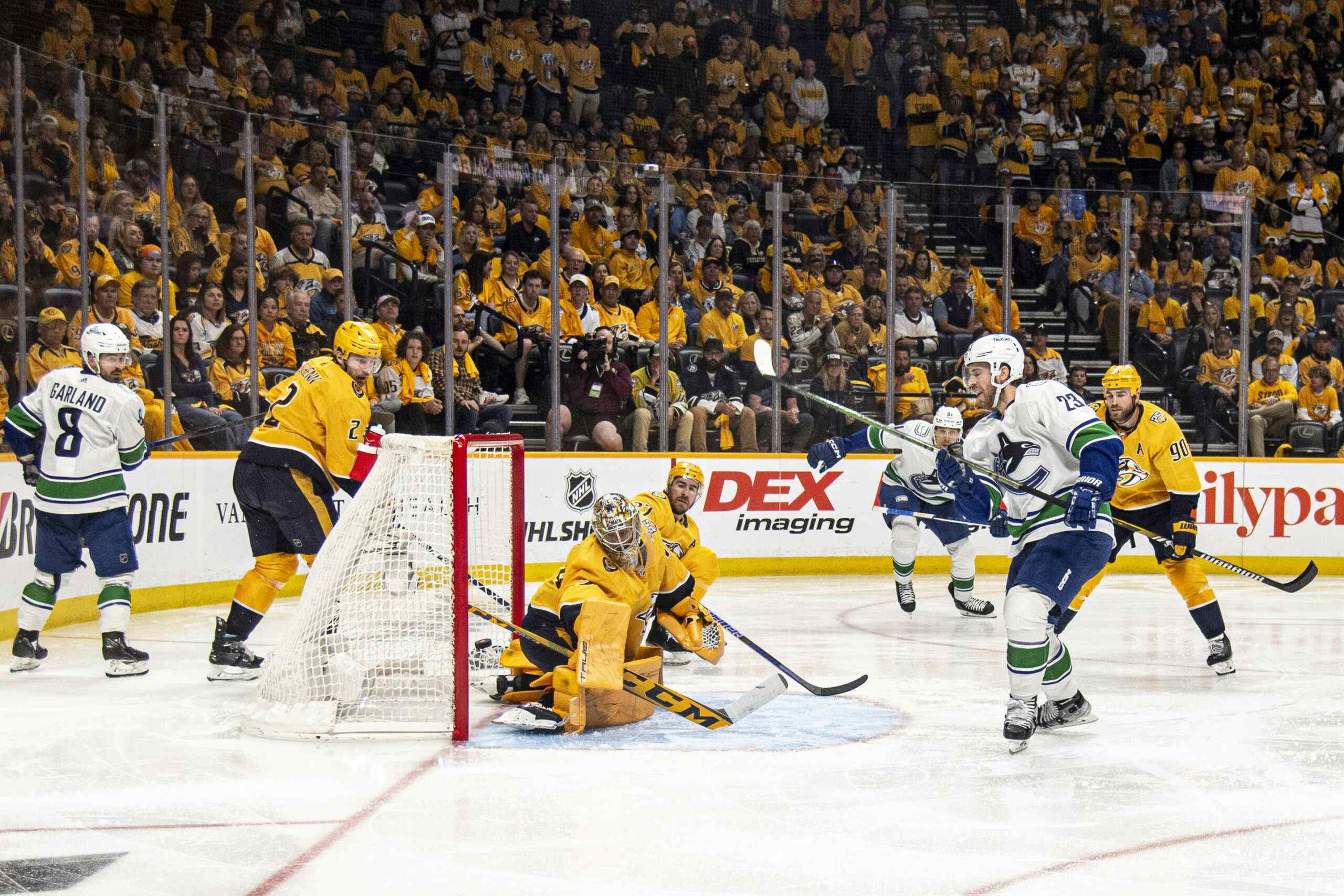Zack MacEwen is Better Than I Thought He Would Be
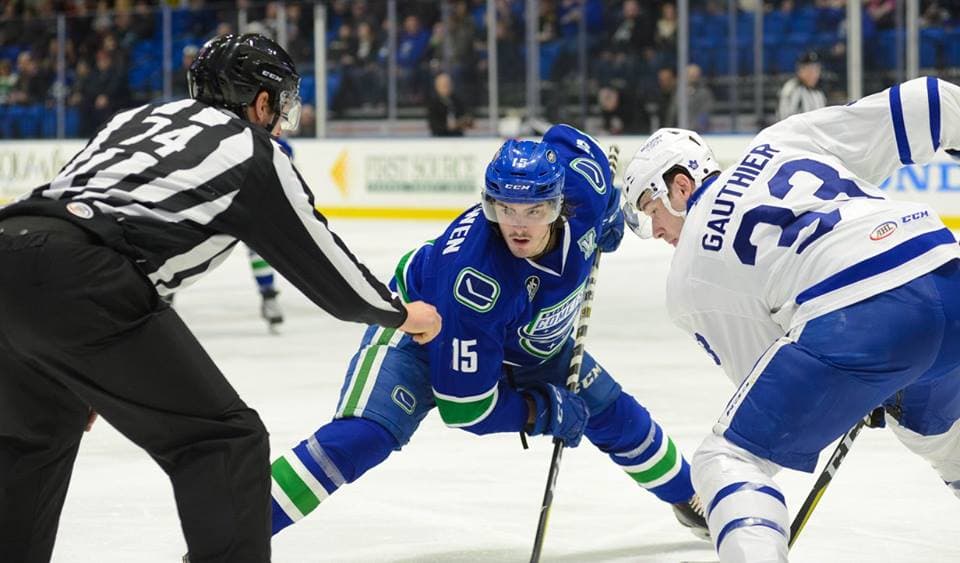
By Jeremy Davis
6 years agoI’ve known this day would be coming for quite a while now.
Way back in the summer, when the Canucks held a summer showcase to show off all of their prospects, Canucks fans got a glimpse at the next crop of prospects. Some came with more cachet than others, and some performed better than their peers. It’s not always the highly touted ones that perform the best. That’s the beauty of a small sample tournament against some volatile competition.
One player who performed pretty well was Zack MacEwen, the QMJHL free agent that the Canucks signed from the Gatineau Olympique late last season. I’ve written on MacEwen once before, and you may recall the article: it was the one in which I lambasted the Canucks for using a contract on him at all.
I’ll admit, it was harsh. Probably unduly so, given the relatively small repercussions of signing a single player. My reaction certainly had as much to do with how little the Canucks were getting out of the previous years’ signings of Yan-Pavel Laplante and Mackenze Stewart – both of whom failed to stick in the American League – as it had to do with MacEwen himself.
The reaction to it was pretty strong at the time. “What if his dad reads this hatchet job,” I was asked. It was never something that I would have considered. I’m still not sure whether I should be considering it.
It hasn’t been forgotten either. I heard about it plenty when MacEwen scored a very nice goal in the Summer Showcase at the Canucks’ prospect development camp.
I heard about it again when he had a strong showing at the Young Stars tournament in Penticton. And I’ve certainly been hearing about it now that MacEwen has gotten himself off to a legitimately strong start in his first professional season. Following Monday’s game, MacEwen had totalled four goals and 20 points in 35 games, tying him for third on the Comets in scoring.
One thing I’ve see a lot since that article: what would I do if I ended up being wrong and MacEwen turned out to be an NHL player?
There’s a simple answer to that: Yes, I’ll admit that I was wrong.
Despite this site’s reputation, our writers haven’t been afraid to admit being wrong before. Our site editor, J.D. Burke in particular, has been forthcoming about players that he’d underestimated in the past, delivering “I Was Wrong” articles on Adam Gaudette and Matthew Tkachuk. Jackson McDonald published an article on the wrongness of the site’s assessment of Bo Horvat back in 2014 on behalf of former editor Rhys Jessop (Rhys is allowed to be wrong in this instance, as he was so very right that other time).
As for myself, I’ve managed to avoid having to publish an article like this. Partly, this is because I was once a very positive fan/writer, and didn’t do many “takedowns”. And it’s partly because I generally refrain from giving too strong of an opinion on something I can’t know with complete certainty, like whether a 20-year old prospect will pan out.
Well this time I pushed all my chips in, and so far it’s not turning out the way I thought it would. He certainly hasn’t made the NHL yet, and there’s a long road to go, but he has wildly surpassed my expectations, and is easily trending more towards NHL call up than ECHL reassignment at this point.
So here it is: Zack MacEwen is better than I thought he would be.
In my defence, for all the impressiveness of MacEwen’s rookie AHL season (in addition to his performances at the Summer Showcase and Young Stars games), it changes nothing about the reasoning that I gave in the original article. There were a myriad of red flags: MacEwen had a very late development curve, he benefited from playing with Vitali Abramov, and he had a lopsided situational scoring distribution.
Still, there are things that I’ve liked about MacEwen. He’s big, for one thing. Size is becoming less relevant in the NHL these days, but the strength that is built into his 6-foot-4 frame is still very useful. He’s got plenty of speed, and he’s got a decent set of hands, especially for a big man. He puts the moves on some defenders now and again in Utica, and doesn’t look like he’s at any serious risk of losing control of the puck when he does.
There are question marks, too. His passing, for instance, is suspect. It can be a little off target, and the velocity is frequently too hard for teammates to handle.
By but and large, many of the red flags that caught my attention when he was signed out of the Q haven’t been present in the American League. His late development curve is no longer as relevant as his current performance. Grouped with players his age in junior, MacEwen wasn’t even playing in the QMJHL (let alone standing out) when he was rookie eligible. Pitted against AHL rookies now though, he stacks up well, sitting 24th in points and 33rd in points per game (minimum 10 GP).
From a prediction standpoint, MacEwen is beginning to look quite promising. He has an Expected Likelihood of Success of 27%, which is, impressively, the fifth highest among Canucks prospects right now (not including Elias Pettersson and Jonathan Dahlen, who are both without comparables by virtue of overmax-ing their cohort production range). His statistical matches include former Canucks like Zack Kassian, Jim Sandlak, and Greg Adams (the good one), as well as current Canucks coach Travis Green. The majority of his matches fall in the bottom six/replacement level range, and pGPS has assigned his cohort a weighted average line assignment of “4th Line Forward”.
Of course, as an amateur free agent signing, a fourth line role in the NHL would be cause for celebration rather than criticism.
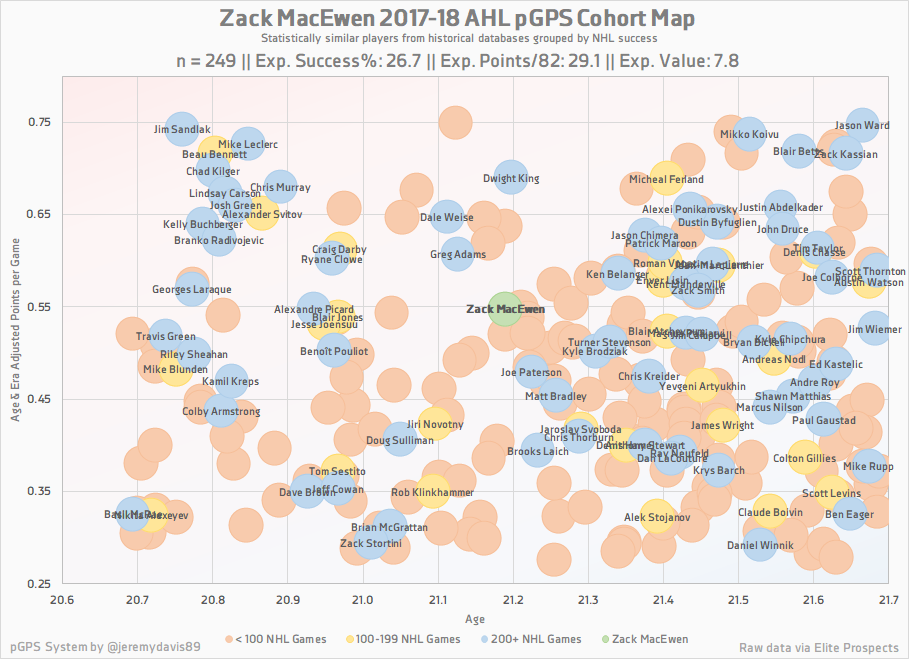
This is a sizable jump up from the projections in his junior career. As mentioned, one of the red flags I originally noted was that he didn’t play regularly in the Q until his draft-plus-two season. In the two junior campaigns, his Expected Likelihoods of Success were rated at 2 and 4%, making this season a very noticeable jump. (It’s the green and red lines you want to pay attention to here – they have the highest degree of predictability).
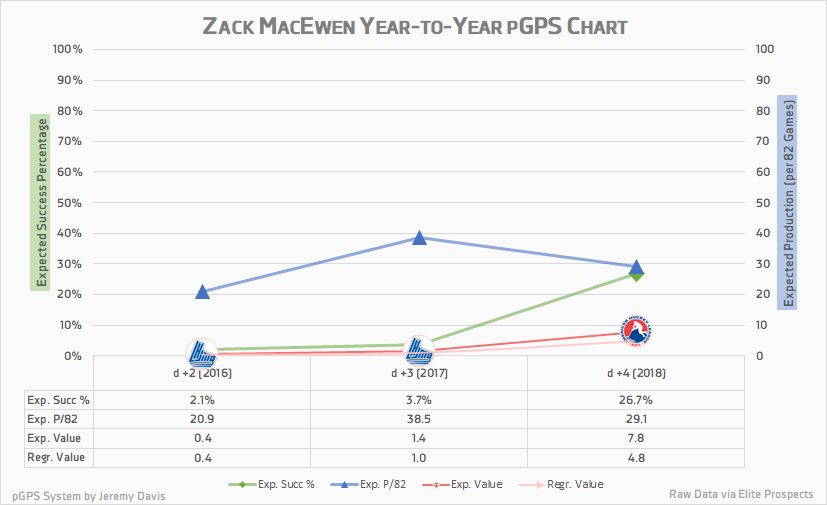
Circling back to another criticism from last season – that he benefited heavily from playing with superior linemates in Gatineau – it would be difficult to insinuate that MacEwen has benefited from playing with any teammates in particular in Utica, especially of late, when the Comets forward ranks have been shredded by an assortment of injuries. He did have the opportunity to play with the likes of Boucher, Goldobin, and Chaput, when they were all together in Utica, but it’s not like all his production came at those times – he’s been pretty consistent with an array of linemates. In fact, check his four goals and you’ll see that eight different players have assisted on them. The same can be said of his assists: they are highly diverse.
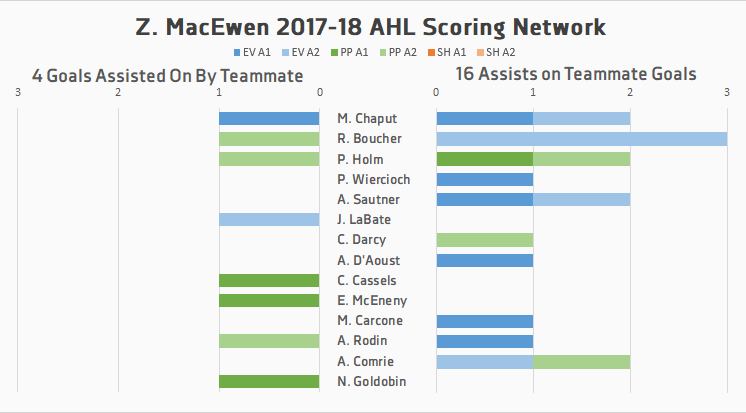
I’ve mentioned before that you can often tell a lot about what a coach thinks of a player by how they are deployed. With MacEwen it was clear early on that he had a believer in Trent Cull. Even before the injury bug starting wiping out the organization, MacEwen started moving up the lineup, playing in the top six after Boucher’s first call up, with Goldobin and Chaput still in the lineup.
MacEwen has also been a fixture on the power play since taking over for Joseph LaBate as the netfront player in mid-November following LaBate’s first injury You can see in the distribution above that most of his power play points (the green bars) are associated with players who populate the first unit: Boucher, Goldobin, Philip Holm, even Cole Cassels of late. MacEwen has also spotted in some penalty kill time with all the injuries, which is a testament to how much the coach trusts him. He has rewarded his coach with consistent effort and production.
So it certainly appears that I underestimated Zack MacEwen. It’s still too early to tell if he’s an NHLer, but with a solid rookie season in the works, he could very well be on the short list as an NHL call up in the latter half of the season. There’s a humbling lesson to be learned here for sure, namely that when it comes to prospects, it’s rarely a good idea to speak with certainty. While many of the ideas that I wrote about hold true, the sheer difficulty in predicting prospect performance year over year necessitates a little (or a lot) more nuance.
I don’t believe this takes away from prospect assessment as a whole. Many times I’ve mentioned that prospect analytics (and hockey analytics in general) is about the weighting of percentages. We deal in probabilities, not certainties. When you make a claim like the one I made, sometimes you look smart, and sometimes you look dumb. Right now, I look the latter. But that hasn’t precluded me from looking right on other things, and it won’t in the future either.
As I’ve mentioned before, I don’t want any of the Canucks’ signings to be bad. I want the players to have success because I want the team to have success because I like the team. I try as much as possible to look at the managerial moves and player performance from an objective standpoint, and would never wish ill on any specific players just so I can be right about something. In Zack MacEwen’s case, it’s excellent news for all involved that he appears to be much better than I originally gave him credit for. In situations like these, I’m more than happy to be proven wrong.
Recent articles from Jeremy Davis


